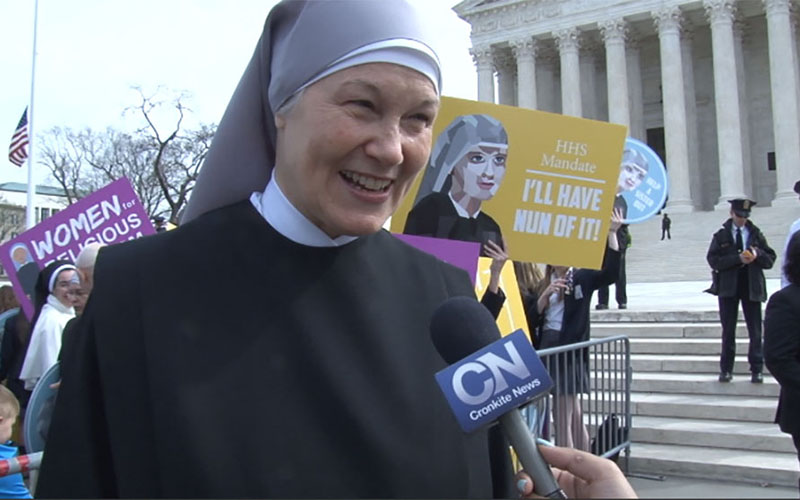
Sister Veronica Susan of the Little Sisters of the Poor, which took its challenge to Obamacare’s contraceptive converage mandate to the Supreme Court. (Photo by Samantha Witherwax/Cronkite News)
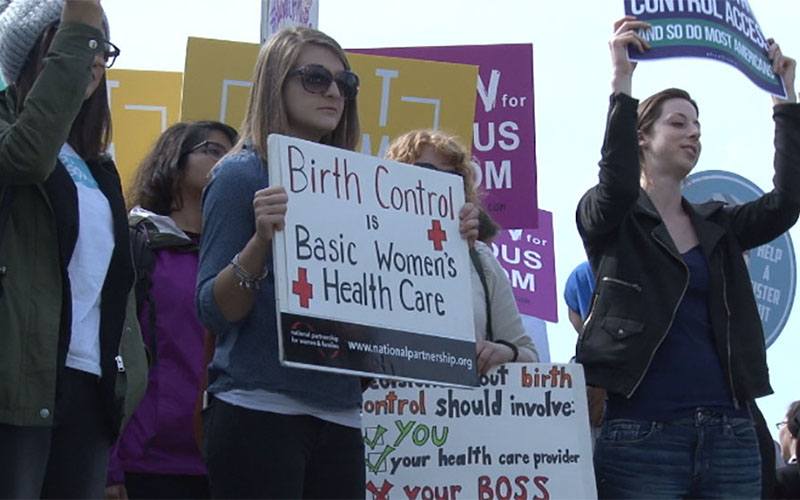
Protesters who back the contraceptive mandate in health care coverage that is required by Obamacare show their support outside the Supreme Court. (Photo by Samantha Witherwax/Cronkite News)
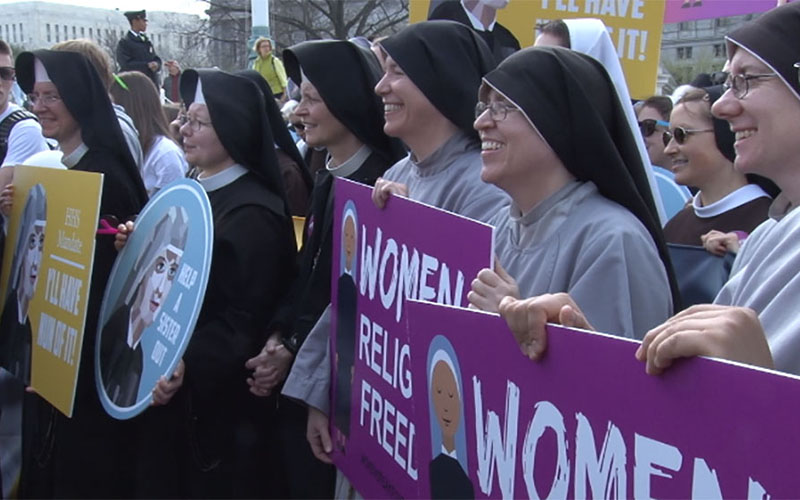
Little Sisters of the Poor protest outside the Supreme Court. They said an Obamacare mandate for contraceptive coverage in health plans violates their religious beliefs. (Photo by Samantha Witherwax/Cronkite News)
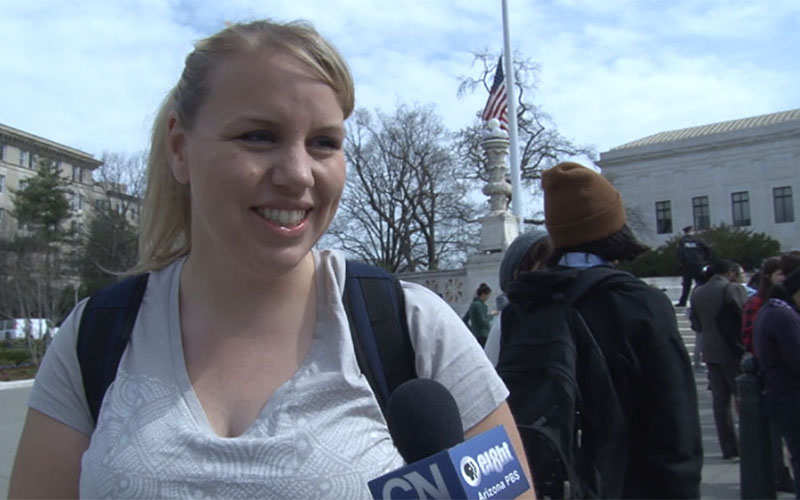
Phoenix resident Betsy Bervin, who stumbled on to the Supreme Court rally, said an employer’s religious beliefs should not trump an employee’s right to coverage. (Photo by Samantha Witherwax/Cronkite News)
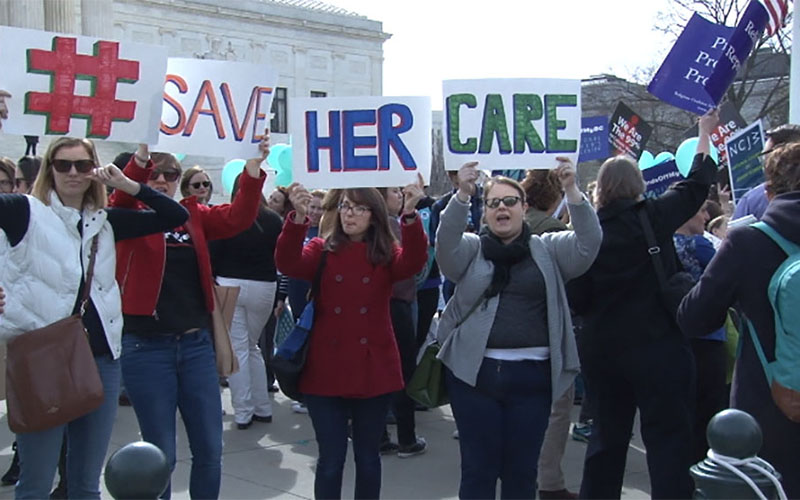
The rally outside the Supreme Court was peaceful, but vigorous, with one side dancing and chanting to the music of Lady Gaga and the other singing religious songs. (Photo by Samantha Witherwax/Cronkite News)
WASHINGTON – Protesters gathered at the Supreme Court Wednesday – one side dancing to Lady Gaga and the other singing hymns – while justices considered whether religious groups can be required to provide contraceptives to employees under Obamacare.
The court consolidated challenges from seven different religious groups that object to certain types of birth control which are required as preventive health coverage under the Affordable Care Act – better known as Obamacare. Companies that do not comply face fines.
The Department of Health and Human Services lets religious groups provide the coverage in plans for their employees without paying directly for birth control. But the opponents said that still makes them “morally complicit in grave sin,” in the words of one brief in the case.
“For us to have to do it within our healthcare provider that we’ve never had to do before is really against what we are,” said Sister Veronica Susan, a member of the Little Sisters of the Poor, one of the seven groups challenging the law.
“So we’re really not prohibiting or pointing fingers at anyone, we’re just saying let us be, OK?” the nun said.
But supporters of the coverage requirement said their rights need to be considered as well.
“We as women here in the United States also need access to birth control, just like everybody else and no employer should have the right to deny anybody the right to have access to their healthcare,” said Nimra Chowdhry, one of the protestors outside the court.
Supporters of the contraceptive requirement danced to popular music blasting over loudspeakers on the court plaza and chanted, “Not the church, not the state, we deserve to decide our fate,” among others. They her signs that said “Shouldn’t pay for my boss’s religion” and “Everyone deserves contraceptive coverage.”
Opponents of the requirement, meanwhile, responded with religious songs and signs of their own – “I’ll have nun of it” and “Help a sister out,” among others – in the emotional but peaceful morning of protests at the court.
Phoenix resident Betsy Bervin – a teacher who happened to come across the protest while she was in Washington for spring break with her friend Matt Emory – sided with the birth-control supporters.
“Everybody has their rights, everybody has their opinions,” Bervin said. “But we live in a country where your religion is different from my religion and that shouldn’t stop me from getting that health care that I’m entitled to.”
– Cronkite News video by Samantha Witherwax
But religious groups claim that besides the moral dilemma, there is a real cost to them – some have argued that businesses that do not comply could face millions in government fines.
Kerri Kupec, a lawyer with the Scottsdale-based Alliance Defending Freedom, does not think religious organizations should be fined for refusing to comply with Obamacare. She said government interference in matters of conscience should anger people “regardless of where you stand on the issue of birth control or the morning-after pill.”
“In our country all Americans should be free to live and operate peacefully according to their beliefs without threat of government punishment,” said Kupec, who was at the court to protest.
Geneva College student Celia Harris said that providing drugs that end life, as critics say some contraceptives will, and providing health benefits to employees are two very different things. Her western Pennsylvania Christian school is one of the groups that was arguing before the Supreme Court Wednesday.
“I’m here today with Geneva College in support of religious freedom,” she said. “Our college is being threatened with an implementation that we would have to pay for certain abortive devices and drugs that we feel go against our religious convictions.”
The court will not likely issue a ruling in the case until early summer.